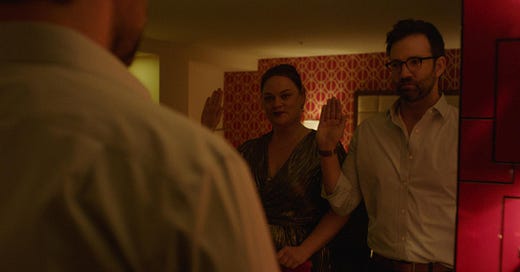Indy Film Fest — The Mirror Game
A sharp, insightful one-room two-hander about overthinking relationships.
For Indy Film Fest showtimes and tickets, please click here.
The Mirror Game’s basic premise is not entirely unique. Two people in a room talking about life, love, and the pursuit of happiness; meanwhile, there may or may not be unspoken tension (sexual or otherwise) between them. Many great stories have been told from this setup.
What I found refreshing about The Mirror Game was its avoidant behavior, with regard to saccharinity and melodrama, coupled with its simultaneous embrace of the idea of having awkward, painful conversations with the people you love, about your love.
Our two characters, Rose and Abe (played marvelously by Teya Patt and Michael Tennant), are childhood friends who’ve grown up and gone their separate ways in life while staying connected. They have similarly cynical senses of humor, progressive worldviews, and clear love of rhetoric and language. They’d be snobs if they weren’t so down-to-earth… and so neurotically self-aware.
The two reconvene, for the first time in a long time, at a Las Vegas hotel room. Abe is in town for a bachelor party and managed to slip away amidst the drunken tomfoolery, and Rose is there on business. They opt to have a night in, rather than out, and catch up on one another’s lives. They talk about their dating lives, drink a little booze, muse about philosophy, and offer one another the kind of life advice only the person who knows you best can give.
I found these early bits, before it really even gets into the heart of the discussion, enrapturing. Patt and Tennant do a great job selling Marissa Flaxbart’s script (originally a stage play), which is accessible and natural but also very wordy and complex.
But it’s not all harmless catching up. Rose has an ulterior motive.
At 37 years old, she’s fed up with the world of dating, and feels like she’s running out of time and opportunity for what she really wants: children. She knows she’d be a good mother, she’s just not convinced she wants to be institutionalized into marriage. Men simply haven’t impressed her thus far, and unfortunately, she doesn’t swing the other way.
So, she figures, why not ask the only man who truly loves her, for who she is, to get her pregnant? He doesn’t have to help raise the kid, just a quick-n-simple platonic knocking up.
The question comes as an understandable shock to Abe, and a drastic tone-shift in the film, but it’s here that Flaxbart and director William J. Stribling really start to get into the meat of what they want to discuss. What is love? What is friendship? What is unfair to ask of someone? Would I be a good father? Why don’t you want me to be the father? Can we even have sex if there’s no sexual attraction? Is there sexual attraction??!
Those ideas may sound relatively broad and trite, but only watching the film can accurately demonstrate the delicacy and detail with which Flaxbart and Stribling have broken these ideas down and put them back together to find new truth.
Rose and Abe’s relationship is incredibly charming, and while it may be easy to think, “You’re perfect together; just get on with it already,” I admire Flaxbart’s and Stribling’s mutual disinterest in such an easy out. Platonic love is just as complex and important as romantic love. At the same time, those two loves often intersect and overlap. Does that mean one should supercede the other? Should they mix at all?
“What’s the exact ratio of platonic love to romantic love that makes a healthy relationship?” sounds like a question the analytical Abe would ask.
The trajectory of their conversations, and subsequently, their relationship, is a joy to behold, and leaves no easy answers. The fact that this film was shot covertly in a real Las Vegas hotel room, at the height of the pandemic, makes its philosophical and technical accomplishments all the more impressive.
The Mirror Game was another pleasure to watch as part of the Indy Film Fest, and you can see it this Friday as well, or online. I highly recommend you do.




